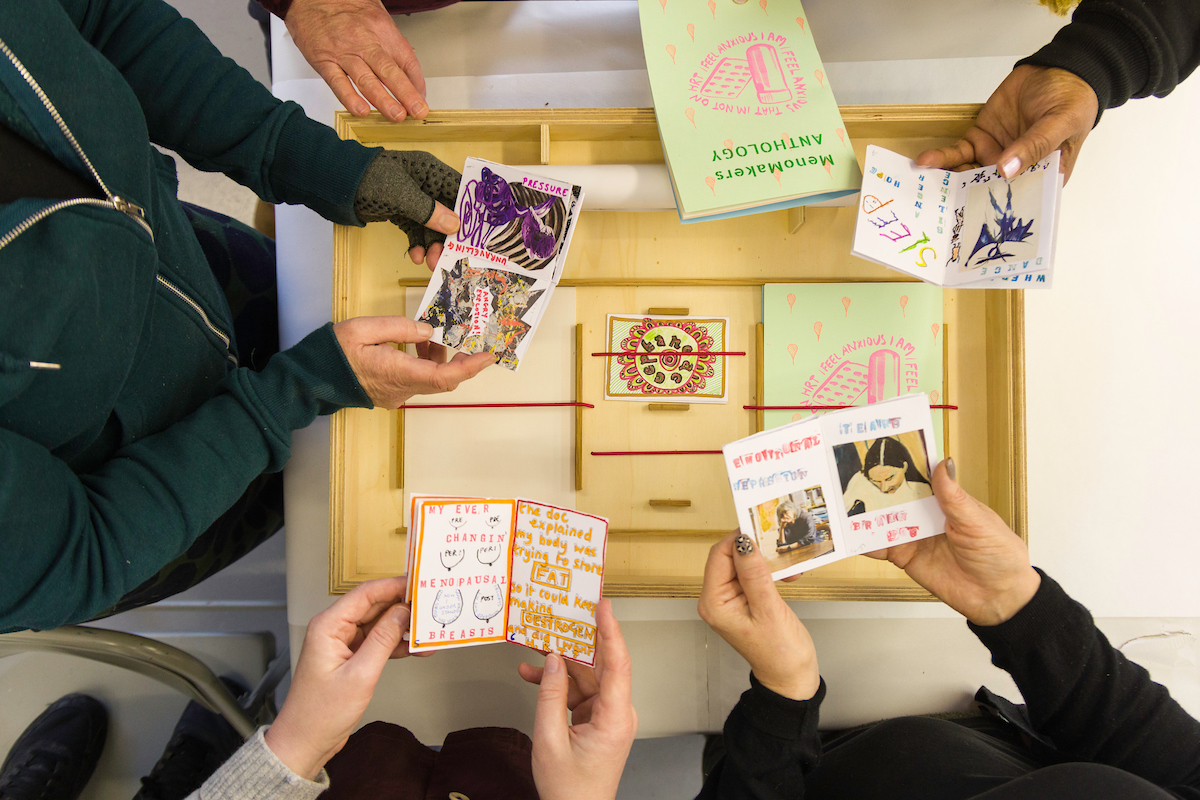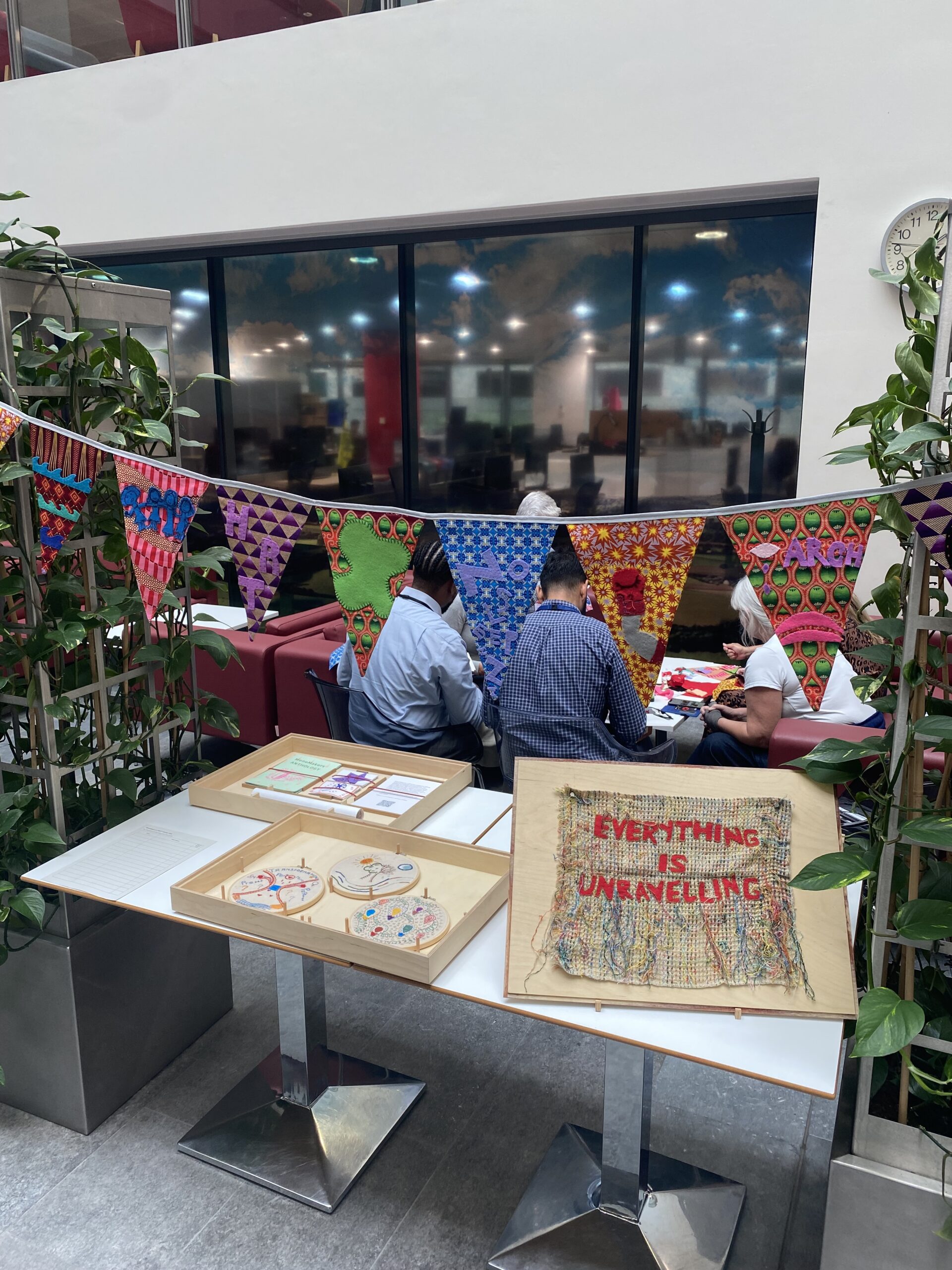Blog by Jessica Hammett, University of Bristol, jessica.hammett@bristol.ac.uk
What’s the relationship between the humanities and public health—rather than medicine? Public health typically focuses on populations rather than individuals, and on the prevention of illness and promotion of health and wellbeing. Sometimes seen as a ‘poor relation’ to biomedicine, it has enjoyed new prominence and recognition since Covid-19—but is often dominated by epidemiologists, modellers, and behavioural scientists. As part of an emerging ‘Public Health Humanities’ network, this short blog series reflects on the place of the humanities within public health.
What can a group of seven women, talking about menopause over a cup of tea while creating things, teach public health researchers and practitioners about menopause? On the face of it these two settings seem worlds apart: a small intimate group has little in common with large-scale health interventions. But the way that menopause is approached by health professionals is not working for those experiencing menopause and a change is urgently needed.
The MenoMakers began on a sunny afternoon in September 2021, with a craft picnic in North Kensington, London. During monthly meetings over the next two years they talked about menopause and represented their feelings and experiences through various artistic methods. You can find out more about the project on our website, which includes images of our exhibition-in-a-box—created and curated by the group—which will soon be available to view in the Wellcome Collection archive.

One of the many subjects we discussed was the problems with public messaging around menopause, and these have also been well documented by researchers. While there has been a boom in menopause coverage in the media, this tends to be fronted by white, slim, fit celebrities who portray non-inclusive expectations of the menopausal body [Jermyn, 2023: https://doi.org/10.1016/j.jaging.2023.101114]. The focus also tends to be on hot flushes – only one of many possibly symptoms—and HRT—which not everyone can or wants to take and, moreover, is not the only treatment available. For many people the experience of visiting the GP has not been any better. GPs are frequently underinformed about the implications of menopause symptoms and what they, as medical professionals, can do about them [Harper et al., 2022: https://doi.org/10.1177/17455057221106890].
The MenoMakers group have experienced these issues first hand and within the group they developed vernacular knowledge which they could use to improve their own medical treatment. They write:
MenoMakers has made us really think about how poorly women’s health is treated in the United Kingdom, globally, by medical providers, employers, society. We’ve had problems talking to GPs, getting referrals, no sympathy or understanding. We didn’t have the language to talk to them clearly and they didn’t listen. In this group we’ve found the anecdotal stuff so valuable, it’s helped us join the dots, someone else might have experienced the same thing or read about it and then you realize you’re not going mad it’s just menopause. Now we can go to our GP all clued up and say ‘I’m feeling this and it’s menopause’. We can stop fighting for recognition and get started on getting better. We’ve come to realise there’s such a large fountain of knowledge out there, in all of us, and without these open discussions we wouldn’t have found it.

Although MenoMakers was not a health education project—it was led by a historian and an artist—the group felt better informed, more able to take positive action and less stigmatised as a result of our work together. The group opened a space for the informal exchange of vernacular knowledge and this was empowering in various ways.
Public health researchers could learn a great deal from this vernacular knowledge. Menopause can have a huge impact on both physical and mental health, in ways that are often not recognised and are different for each person. Members of the MenoMakers group also found that their menopause symptoms interacted with existing and new health conditions in ways that were not well understood. And yet, although each person’s menopause was different, group members had enough in common to reassure each other: ‘We could come to a group and realise it’s not just me, menopause is a thing! it so validates your experience.’
Health professionals could learn from this open-mindedness about what menopause symptoms might look like, as well as how serious their impact can be on physical and mental health, and on day-to-day life. This inclusive approach could usefully be applied to health messaging too, especially the representation of menopause in the media. As the MenoMakers write:
The celebrities coming out and on the one hand saying they’re doing all of this for women and they’re educating women and, on the other hand, they are working out 24/7 and telling everybody how fab they look and leaving all of us feeling, well, are we supposed to be looking like that as well? There’s so much pressure, there’s always pressure on women and to have that as part of the menopause as well… Come on let us off the hook for goodness sake! Our boobs are bigger, our bellies are bigger, skin sagging, hair going grey. That’s part of it. That’s what we’ve got from MenoMakers: transformation, acceptance, embrace.
Finally, public health could make use of the kinds of spaces opened up by groups like MenoMakers. Health support doesn’t only have to come from health professionals, peer-support is also crucial. Indeed, this has recently been recognised by a campaign for the introduction of a menopause education and support programme (led by Joyce Harper and colleagues at UCL [https://www.globalwomenconnected.com/2024/05/menopause-education-2/]).
MenoMakers shows us that public health interventions which facilitate peer-learning, as well as allowing for the wide variety and complexity of symptoms and experience, would radically improve the menopause support currently provided.
Jessica is a modern British historian and Senior Research Associate at the University of Bristol. Her research uses co-production and creative research methods to explore community, mental health and everyday life.